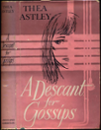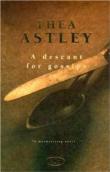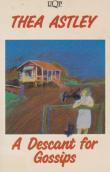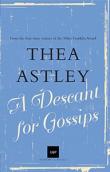'Over a fifty-year period, from 1944 to 1994, Thea Astley published a number of critical writings, including essays, newspaper articles and reviews, and short reflections and meditations on her craft. Despite a renewed interest in Astley’s work, however, most critical interrogations of her oeuvre focus on her novels, and more recently her poetry. As a result, Astley’s critical writing has not been afforded the same breadth and depth of investigation as her fiction. This lacuna is troubling, since Astley’s critical works are important not only for their insight, but for what they reveal about Astley’s self-representation, and in particular the dual identity that she embodied as both a teacher and a satirist. This article argues that these dual roles emerge clearly in Astley’s essays and in fact are inextricable from many of her works. Further, the tensions between these two personae — Astley as teacher and Astley as satirist — reveal natural overlaps with her imaginative writing, and reflect her changing ideas about fiction writing, literature, and education.' (Publication abstract)







